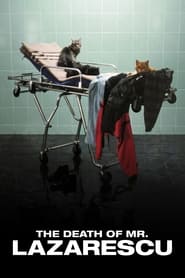Going through a series of contemporary reviews of this film by US critics, it seems that, perhaps through being E.R. pilled or something, they read the in-film treatment of Mr. Lazarescu as especially callous and perhaps something of an anomaly, even taking into account the expected state of Romanian healthcare and socialised medicine writ large. But for someone who has an (admittedly slight) experience with an austerity-eviscerated NHS, it reads to me much more of an extremely gripping documentary. What might be different about a putative British 'remake' of this film for 2024 is that it would depict Mr. Lazarescu being explicitly and suspiciously questioned on his right to access healthcare that he so obviously needs, but Lazarescu would also seem weirdly (and completely genuinely) obligated to be thankful to the staff of "our NHS", who, simply by means of working within such an immiserated system, were in fact not providing him with adequate care at all. What makes me more certain about this is reading Peter Bradshaw (from the British Guardian), who, in 2006, wrote that within the world of the film, "business there is conducted at a Soviet tempo of bureaucratic resentment and depression." Perhaps he would revise his somewhat 'othering' aspect today after 14 years of austerity.
Like the Dardenne brothers’ films, The Death of Mr. Lazarescu seems effortlessly observed, even improvised, but it’s actually a wonder of choreography, rhythm and social commentary. Some viewers are bound to walk away scratching their heads, but those who join its groove will find one of the real surprises of the year.
— Robert Davis (Paste Magazine)
I have undergone various medical adventures in recent years, and have been moved by the unfailing competence and care of the doctors and nurses I have come into contact with; I admire them even more because I sense this movie is accurate about many hospitals everywhere, in which everyone is overworked, there are more problems than solutions, and the smelly, incoherent Mr. Lazarescu seems doomed no matter what is done. He is not a candidate for triage.
It seems extraordinary to claim that this film is funny but it is, because Lazarescu's decline into catatonia and stillness - mumbling, wheezing and whimpering against the dying of the light - is in superb counterpoint to the loquacious performances from incidental characters, forever jabbering and squabbling with each other about trivial matters while Lazarescu goes into his twilight moments. […] Part of the film's brilliance is its stunning and unforgiving transmission of the great truth that for most of us, death is not a single, flatline moment, but a gradual, insidious process of deterioration. When does it begin: in one's 70s? Or 60s? 50s? 40s? Is the second half of our life a matter of swimming harder and harder and harder against the receding tide? Perhaps. But the process is heroic, and Mr Lazarescu, even though he has so little to say, has the mute rhetoric of a hero.
— Peter Bradshaw (Guardian)

